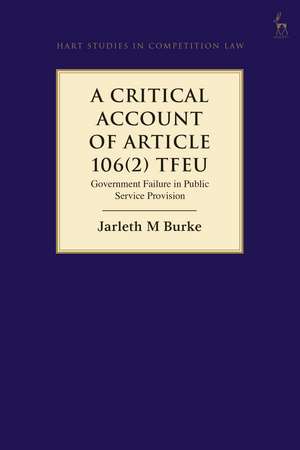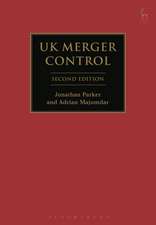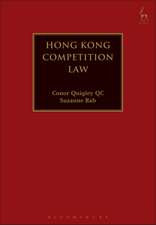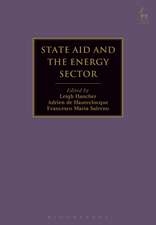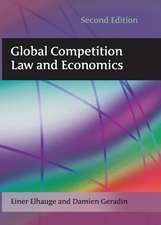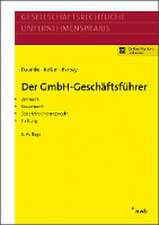A Critical Account of Article 106(2) TFEU: Government Failure in Public Service Provision: Hart Studies in Competition Law
Autor Jarleth Burkeen Limba Engleză Hardback – 21 mar 2018
| Toate formatele și edițiile | Preț | Express |
|---|---|---|
| Paperback (1) | 270.75 lei 6-8 săpt. | |
| Bloomsbury Publishing – 22 iul 2020 | 270.75 lei 6-8 săpt. | |
| Hardback (1) | 540.31 lei 3-5 săpt. | |
| Bloomsbury Publishing – 21 mar 2018 | 540.31 lei 3-5 săpt. |
Din seria Hart Studies in Competition Law
- 30%
 Preț: 956.51 lei
Preț: 956.51 lei - 21%
 Preț: 275.26 lei
Preț: 275.26 lei - 18%
 Preț: 313.74 lei
Preț: 313.74 lei - 18%
 Preț: 313.07 lei
Preț: 313.07 lei -
 Preț: 315.54 lei
Preț: 315.54 lei - 22%
 Preț: 270.75 lei
Preț: 270.75 lei - 30%
 Preț: 540.54 lei
Preț: 540.54 lei - 27%
 Preț: 777.24 lei
Preț: 777.24 lei - 14%
 Preț: 893.15 lei
Preț: 893.15 lei - 30%
 Preț: 539.18 lei
Preț: 539.18 lei - 21%
 Preț: 217.35 lei
Preț: 217.35 lei -
 Preț: 365.91 lei
Preț: 365.91 lei - 22%
 Preț: 238.22 lei
Preț: 238.22 lei - 30%
 Preț: 779.09 lei
Preț: 779.09 lei - 18%
 Preț: 313.46 lei
Preț: 313.46 lei - 22%
 Preț: 261.17 lei
Preț: 261.17 lei - 23%
 Preț: 255.76 lei
Preț: 255.76 lei - 18%
 Preț: 299.96 lei
Preț: 299.96 lei - 21%
 Preț: 235.29 lei
Preț: 235.29 lei - 22%
 Preț: 250.09 lei
Preț: 250.09 lei - 18%
 Preț: 322.05 lei
Preț: 322.05 lei - 30%
 Preț: 894.38 lei
Preț: 894.38 lei - 22%
 Preț: 780.23 lei
Preț: 780.23 lei - 30%
 Preț: 539.57 lei
Preț: 539.57 lei - 24%
 Preț: 189.80 lei
Preț: 189.80 lei - 30%
 Preț: 837.39 lei
Preț: 837.39 lei -
 Preț: 319.13 lei
Preț: 319.13 lei - 22%
 Preț: 251.65 lei
Preț: 251.65 lei - 30%
 Preț: 569.22 lei
Preț: 569.22 lei - 30%
 Preț: 961.39 lei
Preț: 961.39 lei - 27%
 Preț: 1136.75 lei
Preț: 1136.75 lei
Preț: 540.31 lei
Preț vechi: 774.01 lei
-30% Nou
Puncte Express: 810
Preț estimativ în valută:
103.39€ • 108.33$ • 85.47£
103.39€ • 108.33$ • 85.47£
Carte disponibilă
Livrare economică 21 martie-04 aprilie
Preluare comenzi: 021 569.72.76
Specificații
ISBN-13: 9781509912759
ISBN-10: 1509912754
Pagini: 256
Dimensiuni: 156 x 234 x 23 mm
Greutate: 0.54 kg
Editura: Bloomsbury Publishing
Colecția Hart Publishing
Seria Hart Studies in Competition Law
Locul publicării:London, United Kingdom
ISBN-10: 1509912754
Pagini: 256
Dimensiuni: 156 x 234 x 23 mm
Greutate: 0.54 kg
Editura: Bloomsbury Publishing
Colecția Hart Publishing
Seria Hart Studies in Competition Law
Locul publicării:London, United Kingdom
Caracteristici
The book provides an analytical and critical reading of a key and controversial provision in competition law.
Notă biografică
Jarleth Burke is a barrister specialising in competition law and economic regulation and he is a fellow of the Tilburg Law and Economics Centre (TILEC).
Cuprins
1. In the General Interest? A. Introduction B. The Nature of the Problem C. The Mechanics of Article 106(2) D. The Essence of Government Failure and its Cost E. This Book 2. The Pathology of Government Failure A. Introduction B. Government Failure and Market Failure C. The Constitutional Grounding for Government Failure Control Under Article 106(2) D. Approaches to Government Failure E. Government Failure Under Article 106(2) F. Conclusions 3. The Contestation and Indeterminacy of Article 106(2)A. Introduction B. The Political, Constitutional and Administrative Battleground C. Accounts of Article 106(2) D. Conclusions 4. A Most Contingent Exemption A. Introduction B. Contestation-The Scope of Article 106(2) Ratione Materiae C. Competition-The Free Movement Derogations D. Subordination-The State Aid Rules E. Conclusions 5. Government Failure in Assessing Market Feasibility A. Introduction B. Telecommunications C. Environmental Protection D. Broadcasting E. Conclusions 6. Government Failure in Disapplication Review A. Introduction B. The First Phase-The Strict Exception C. The Second Phase-Permissive Derogation D. The Third Phase-Partial Revival E. Conclusions 7. Contours of a Better Exemption A. Introduction B. Government Failure Redux C. Proposals for a Reorientation of the Law with Respect to SGEIs D. Concluding Observations
Recenzii
Making sense of art.106(2) TFEU and the case law around it is not an easy task and even less so is providing a critical and well-reasoned proposal for its improved implementation. Hence, the author of this book has surely chosen a challenging task and is to be congratulated for mastering it in great detail and with a commendable measure of sophistication throughout the book.
